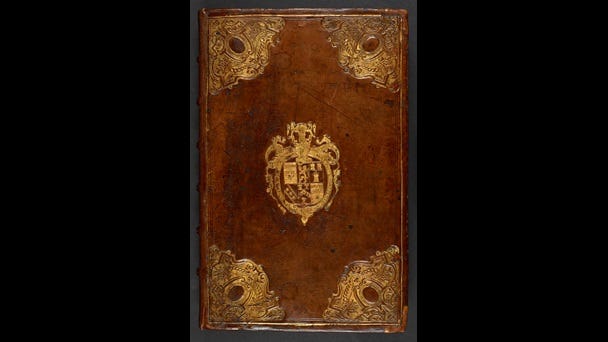Orlando Furioso
wreaking havoc on the world, plus a trip to the Moon.
Ludovico Ariosto (1474 – 1533) was an Italian poet best known as the author of the romance epic, Orlando Furioso (1516). It is one of the most influential poems ever written.
Orlando Furioso tells of the war between King Agramante of Biserta and Charlemagne and Orlando’s infatuation with Angelica of Cathay. Orlando goes mad when he discovers Angelica has relinquished her virginity to Medoro, a simple foot soldier. Unable to sustain this knowledge Orlando returns to the forest and strips the armor that made him a knight, and the clothing that marked him as human. In this bestial state, he begins to wander the globe wreaking havoc indiscriminately on the plants, animals and humans he encounters in his path.
Prince Astolfo of England retrieves Orlando’s wits in a phial on the moon
Prince Astolfo of England flies to the moon and retrieves Orlando’s wits in a phial on the moon and cures Orlando of his insanity when he inhales his wits. The rehabilitated knight makes amends for his sinful behavior by using his regained faculties to further the Christian cause.
Ariosto’s Orlando Furioso in English, 1591
The first full English translation (1591) of Orlando Furioso, a source for Much Ado About Nothing, is in the British Library.
Orlando Furioso was a major influence on:
Edmund Spenser's epic The Faerie Queene,
William Shakespeare's Much Ado About Nothing
mentioned among the romances in Don Quixote.
Sir Walter Scott's novel Rob Roy -a plot device
Russian poet Osip Mandelstam paid tribute to Orlando Furioso in his poem Ariosto (1933).
Italian novelist Italo Calvino drew on Ariosto for several of his works of fiction including Il cavaliere inesistente ("The Nonexistent Knight", 1959) and Il castello dei destini incrociati ("The Castle of Crossed Destinies", 1973).
Argentine writer Jorge Luis Borges included a poem, Ariosto y los árabes (Ariosto and the Arabs), exploring the relationship between the epic and the Arabian Nights, in his 1960 collection.
English novelist Anthony Powell's Hearing Secret Harmonies (1975) includes images from Orlando Furioso.
British writer Salman Rushdie's 2008 novel The Enchantress of Florence was inspired by Orlando Furioso.
Science fiction writer Theodore Sturgeon's 1954 short story "To Here and the Easel" is an assembly of portions of the Orlando story.




"Orlando goes mad when he discovers Angelica has relinquished her virginity to Medoro, a simple foot soldier. Unable to sustain this knowledge Orlando returns to the forest and strips the armor that made him a knight, and the clothing that marked him as human."
On the one hand, a redoubtable knight going mad because of love is a pretty time-honored theme; on the other hand, DUDE, pretty sure her ladyparts still work just fine!
elm
i wonder how much influence it hand on pantagruel
There is only one Kathleen !!!! Thank you soooo much.